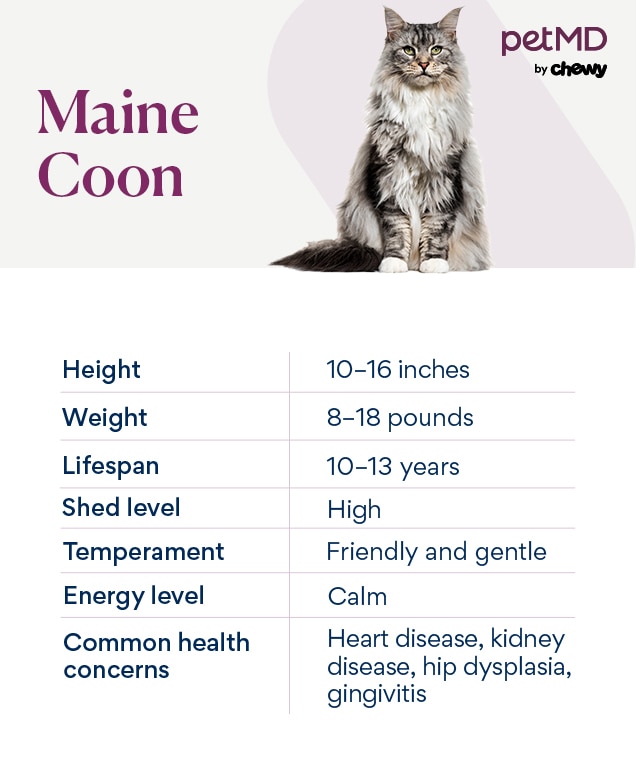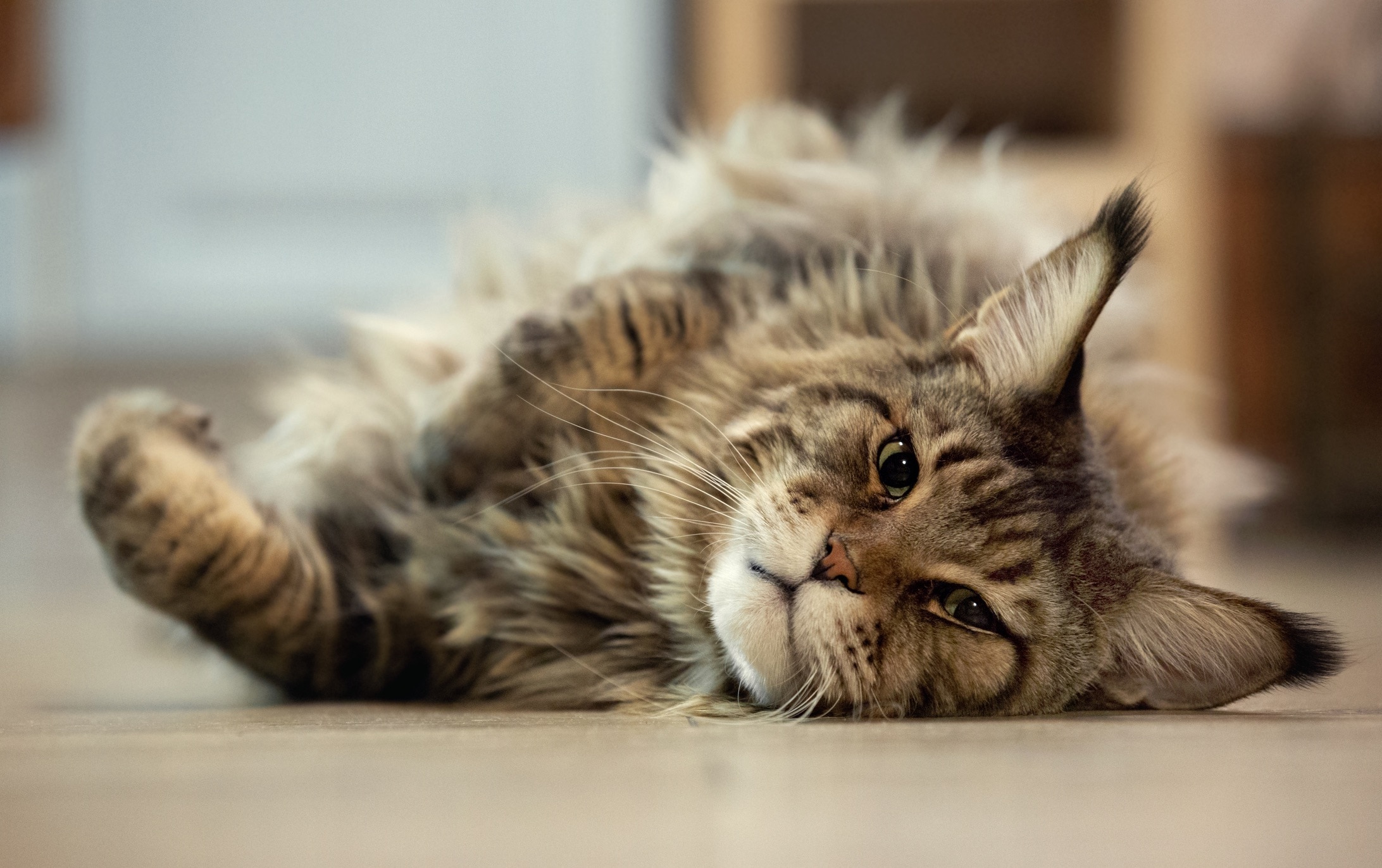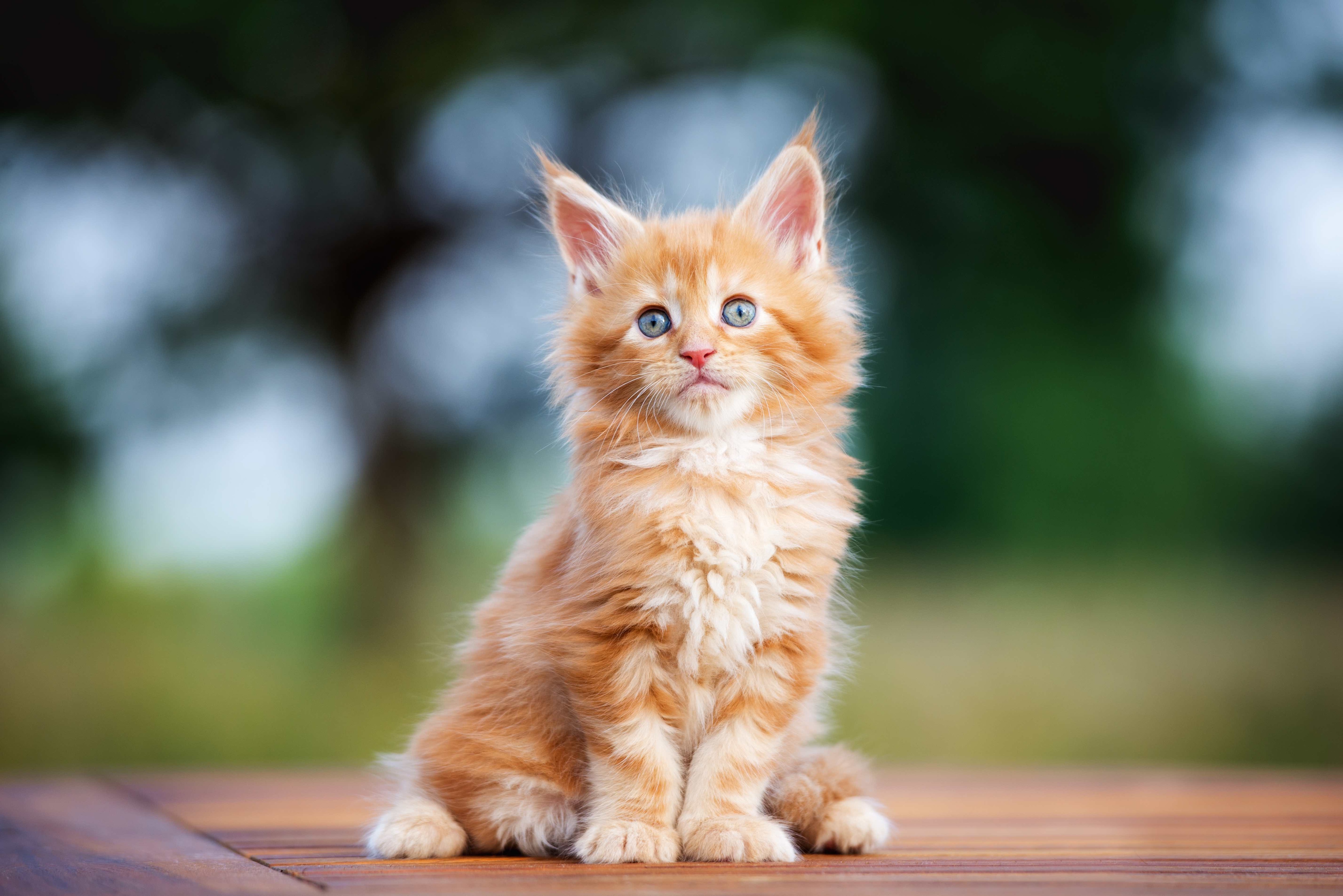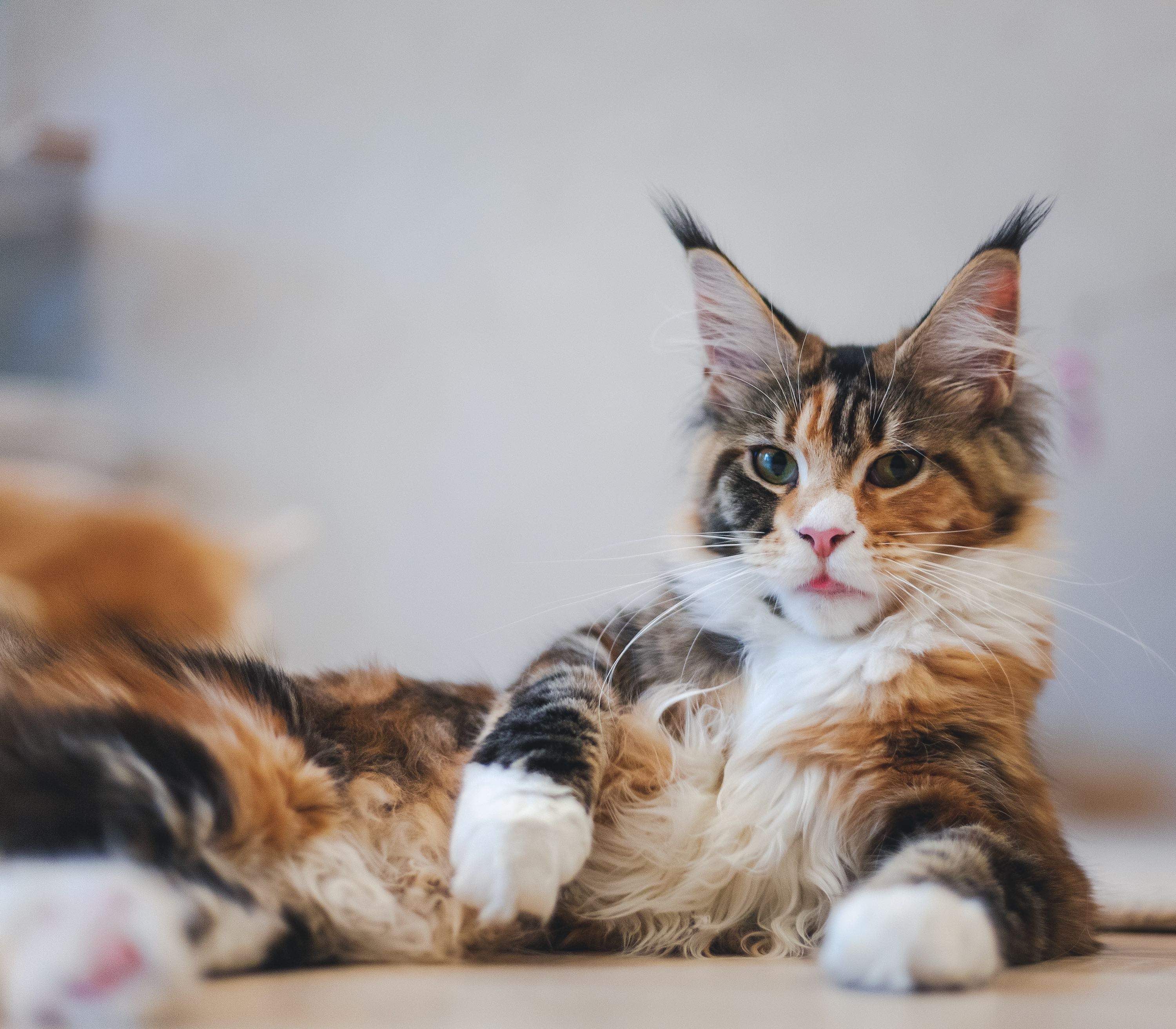Maine Coon
iStock/nikkytok
True to their namesake, the massive Maine Coon originated in Maine, where the breed remains the official state cat. Rumor has it they might even be related to the feline companions of Marie Antoinette, says Nicole Savageau, VMD, an Austin-based mobile veterinarian at The Vets.
Regardless of their ancestry, there’s no denying Maine Coons are a hardy breed well-suited to prowl around in the harsh New England winters.
There is no such thing as a small lap cat when it comes to Maine Coons: Adult males can weigh up to 25 pounds, with their slightly daintier female counterparts weighing 10–14 pounds.
But don’t let the impressive Maine Coon size fool you: These gentle giants have personalities just as soft and fluffy as their fur.
Caring for a Maine Coon

Thanks to their big, lovable personalities and pup-like quirks, Maine Coons have settled in as one of the most popular house cats across the U.S.
They’re also one of the largest domestic cat breeds. They have longer bodies than most breeds, and much larger heads and paws.
In fact, Maine Coons use their furry paws as fluffy snowshoes, says Savageau. And for even greater stability on slippery slopes, many Maine Coons are “polydactyl,” meaning they have extra toes on each paw.
Along with being big, Maine Coon cats have some dog-like mannerisms, like their love for water and tendency to play fetch. All in all, they’re a laid-back group of cats that love spending time with their family.
Maine Coon Health Issues
The typical Maine Coon lifespan is around 13 years, which is on the shorter end of the average cat life expectancy. And because they’re prone to inheriting certain diseases from their parents, Savageau recommends purchasing health insurance when you bring home a Maine Coon kitten.
Hypertrophic Cardiomyopathy
Hypertrophic cardiomyopathy (HCM) is the most common form of heart disease in cats.
Many cats don’t show symptoms in the early stages of the disease. But as it progresses, cats may go into heart failure and show symptoms including shortness of breath, coughing, and lethargy.
Fortunately, there are a few approaches to getting ahead of the disease:
-
At-home feline DNA tests. HCM is a heart disease that, genetically, presents different across breeds. “Maine Coons can have a mutation in two genes that can cause this disease,” Savageau explains. At-home DNA tests may have the technology to test for these mutations before your cat shows clinical signs.
-
Preventative care. The gold standard of preventive medicine for Maine Coon cats is to have an annual echocardiogram (heart ultrasound), Savageau says. It’s also useful to ask your Maine Coon breeder if HCM runs in your cat’s lines.
Spinal Muscular Atrophy
Spinal muscular atrophy is a neurological disease that affects a cat’s physical abilities but not their cognitive functions.
Maine Coon kittens with spinal muscular atrophy typically show signs when they’re 3–4 months old. They likely have decreased muscle tone and weakness, causing a wobbly walk and tremors.
While the condition requires special care, a cat with spinal muscular atrophy can live a long, happy life.
Polycystic Kidney Disease
Polycystic kidney disease (PKD) is the most common inherited disease in cats. This disease cause fluid-filled cysts in the kidneys, which lead to irreversible damage and kidney failure.
Like HCM, at-home DNA kits can test your cat for PKD before symptoms appear. If you’re working with an experienced Maine Coon breeder, ask if both parents have been genetically tested for the disease.
Hip Dysplasia
If your Maine Coon is avoiding the stairs, not jumping up to their favorite perch, or no longer squatting in the litter box, they might have hip dysplasia.
Cats with hip dysplasia have a genetic condition where the hip joint isn’t formed properly. This can occur in one or both hips, which can lead to arthritis and pain.
Managing hip dysplasia includes weight management, a joint-healthy diet, and (in severe cases) surgery.
Chronic Gingivitis
Gingivitis is inflammation of the gums, and it’s considered the earliest stage of dental disease in cats. While all cats are at risk of gingivitis, Maine Coon cats may be at risk of developing feline juvenile gingivitis when they’re as young as 6 months old.
Brushing your cat's teeth daily and scheduling routine veterinary exams are the most effective ways to prevent dental disease.
What To Feed a Maine Coon

Maine Coon cats can eat a high-quality diet similar to other cat breeds, which includes animal protein-rich food labeled with a nutritional adequacy statement for their life stage from the Association of American Feed Control Officials (AAFCO), Savageau says.
Additionally, Royal Canin offers a diet specially formulated for Maine Coon cats. Pet parents can feed Royal Canin's Maine Coon food for growth to their Maine Coon kittens, followed by the adult maintenance formula when they reach 2 years of age.
Talk to your vet to find the best cat food for your pet.
How To Feed a Maine Coon
Maine Coon cats have the longest whiskers of any domestic cat breed, so they prefer extra-wide food and water bowls to prevent whisker fatigue.
While water fountains can encourage your cat to hydrate, Maine Coons love playing in water. So don’t be surprised if you find your water-loving feline with their paws in the fountain!
How Much Should You Feed a Maine Coon?
The amount of food you should feed your Main Coon cat depends on their weight, lifestyle, health, and other factors.
Look to your cat food packaging to find general feeding guidelines, but the best option is to talk with your vet. Your veterinarian will provide the best individually tailored diet recommendations for your cat.
Nutritional Tips for Maine Coons
Cat foods with an AAFCO nutritional adequacy statement will give your cat everything they need for their life stage. Maine Coon kittens should be fed food for growth or all life stages, while adult cats should be fed age-specific food.
Typically, supplements don’t need to be added to your cat’s food unless your veterinarian recommends them, Savageau says. That said, proactive pet parents may want to ask their vet whether joint supplements can help their kitty.
Behavior and Training Tips for Maine Coons

While every cat is an individual, Maine Coon cats tend to be laid-back and affectionate companions.
Maine Coon Personality and Temperament
The mellow Maine Coon can be an excellent addition to any family. “They’re the perfect family cat because they get along well with kids and other animals,” Savageau says.
They may be giants, but Maine Coons are also gentle and affectionate. Plus, they rarely meow—instead, you’ll likely hear your Maine Coon chirp, chatter, and trill.
Maine Coon Behavior
Just like any other cat breed, Maine Coons need daily socialization and exercise to stay happy. By playing with your cat for two or three 10- to 15-minute sessions a day, you’ll help deter unwanted behaviors like excessive vocalization and scratching the furniture.
Though they have playful bursts, Maine Coon cats are happy to spend most of their day snoozing in their cat bed, on a sunny windowsill, or on the couch next to you.
Maine Coon Training
Litter box training comes naturally to most cats when the placement and setup of the litter box are to their liking.
However, Maine Coons are highly intelligent and curious, making them eager to learn more than just litter box use. With positive reinforcement and a training clicker, Maine Coons can learn fun tricks (such as fist bumping) and practical commands (including recall).
Training your cat adds valuable enrichment to their life and strengthens the bond between you and your feline BFF.
Fun Activities for Maine Coons
-
Playing fetch
-
Sunbathing on a window perch
-
Birdwatching from a catio
Maine Coon Grooming Guide

Maine Coon cats have thick, long coats that can become oily or matted without routine grooming. Here’s what you should know about their grooming needs.
Skin Care
If you notice excessive oil in your cat’s fur, it might be time for an at-home bath. Most Maine Coon cats are open to the occasional bath, especially if introduced to bathing when young.
Ask your vet if you need to bathe your cat.
Coat Care
A Maine Coon cat’s fur can come in all shades and colors—from pure white to tabby, calico, and chocolate. No matter the color, they have thick, double-layered coats that originally helped them survive the Maine winters, Savageau says, though most Maine Coon cats happily live indoors these days.
The Maine Coon breed requires routine grooming to prevent matting and reduce their heavy shedding. Brushing your cat at home two to three times a week should do the trick.
If your cat’s fur gets large mats, they may need an appointment with a professional cat groomer.
Eye Care
Maine Coon cats have oval-shaped eyes in shades of gold, green, and blue. Their eyes don’t typically need special care, but if you spot unusual discharge, redness, or general crustiness, make an appointment with your veterinarian.
Cat eye problems are usually resolved with a quick round of medicine.
Ear Care
To prevent ear infections in your Maine Coon’s extra-large ears, keep them clean and dry, especially after a bath or swim.
“If they happen to get an infection, the ear canals will be red and smelly, and have a discharge,” Savageau says. “The cat would need to be seen by a vet.”
Ask your vet how to clean your cat’s ears and which cleansing product they recommend.
Nail Care
Trim your cat’s nails every four to six weeks, or whenever it becomes painful for your Maine Coon to knead on you. Nails that are too long can not only leave scratches on your skin, but they can cause problems for your cat, too.
Considerations for Pet Parents

Bringing a Maine Coon kitten home means making them a full part of your family. While they’re a little too big to be lap cats, they’re affectionate and require ample socialization with the people they love.
As well as quality time with their favorite humans, Maine Coons need engaging activities to stay happy. “Buy them a very large, tall cat tree,” Savageau says. A tree at least 6 feet high with a sturdy base will give your colossal cat plenty of room to stretch and climb.
In fact, everything should be a little bigger for your Maine Coon, from litter boxes to cozy beds.
Maine Coon FAQs
Do Maine Coon cats make good house pets?
Yes, Maine Coon cats are great with children and other pets. They are intelligent and curious, making them ideal for training and teaching tricks.
How much are Maine Coon cats? Are Maine Coon cats expensive?
Maine Coon cats cost anywhere between $400–$2,000. When considering adding any pet to your family, it’s also important to budget for routine and emergency care, like grooming, medical visits, and pet sitters.
If you’re interested in adopting a Maine Coon, you might spot one (or a Maine Coon mix) at your local shelter. Additionally, there may be a Maine Coon rescue near you.
How big can a Maine Coon cat get?
The Maine Coon cat size is very impressive; they’re one of the largest domestic cat breeds. Males can range from 18–25 pounds while females can range from 10–14 pounds.
Is a Maine Coon high maintenance?
Maine Coons are longhaired cats that need daily brushing to stay tangle-free. This daily upkeep might make a Maine Coon “high-maintenance” to some pet parents, but other than their grooming needs, these large cats are relatively laid-back.
